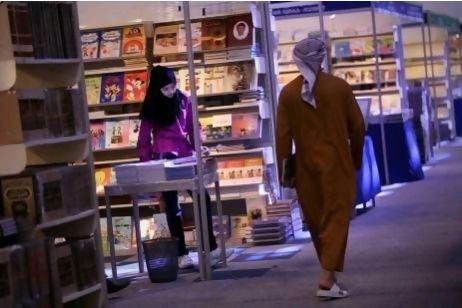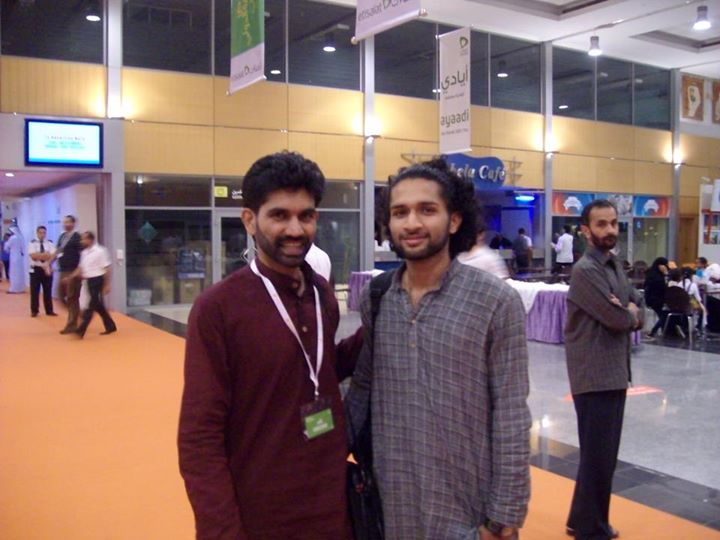Sharjah Turns New Pages
Conveying somber mood over his non-participation this year, MUHAMMED NOUSHAD remembers the 30th Sharjah International Book Fair and the encounters he had with the people and books during the fair, as the event this year has ended last week.
In a November midnight in 2011, Ali Ahsan and I landed in Sharjah Airport, to attend the 30th Sharjah International Book Fair. Next morning, Rafeek Umbachi, my poet friend, showed me the streets of Sharjah, particularly the corniche area, reminding me of the short stint I had in this city as an instructor in filmmaking; the streets were decorated with innumerable banners of the book fair. Typical vertical banners, with the caption “For Love of the Written Word”, welcoming publishers and writers and agents and book lovers, in English and Arabic, to the GCC’s best known book fair, and one of the best in the entire Arab world. As that year marked the 30th anniversary, they had added one more line to the caption “Turning A New Page”.
We represented Other Books, an alternative publishing house based in Calicut. We had titles to sell and contracts to settle. At the huge Sharjah expo centre, where the fair was being held, it was a common sight that Arab men and women walking from stall to stall, pushing trolleys full of books. It looks like you are in a shopping mall that sells only books. You remember Borges imagining paradise a sort of expanded library.
I remember the fair had a fairly simple beginning. The knowledgeable Sultan of Sharjah, Dr. Sultan Muhammed Al Qasimi, came to inaugurate it. It was a surprise to see him on the previous day at the Expo, perhaps checking the final preparations, surrounded by his immediate entourage. During the inaugural session, diplomats and ambassadors of various countries, ministers of his administration and other dignitaries were present, apart from hordes of media personnel from and outside the country. The sound of traditional Arabian drums beaten by kandura-wearing Arab youngsters didn’t let me sit calmly at the Other Books stall. They were singing “marahabaa salaam” in temptingly loud beats. I ran to see a sophisticated crowd, in cosmopolitan attires, waiting for the Sultan. When he reached, more than the security personnel, local and international media people guarded him. He entered the pavilion of the Kingdom of Saudi Arabia, which was the most exquisitely and perhaps most expensively designed. There was a formidable media crowd, preventing my view, and I raised my camera above those heads and umpteen cameras to record whatever happened inside the room: we had absolutely no idea of what was going on. The cam soon showed me: a group of small girls dressed in fabulous colours dancing to welcome the Sultan. I remembered the Oppana tradition, back in Malabar, just as the duff kept in the hands of those strong Bedouin looking Arab men, this art form could also have a link with Mappila culture. Ajeeb Komachi’s photo series, on the various aspects of Indo-Arab relations, which was being exhibited at Gulf Madhyamam stall had some indications about it.
While sitting in a stall at the fair, on a daily basis, you naturally encounter the possibility of meeting strangers. And wonderful friends, yet unknown and unmet. As you instantly realise you share certain very special things with this man or woman, apart from what you have with any other human being. You read, they too read. You have the habit of opening books and immersing deep in them for hours. They too have. That fraternity is precious and promising. Everyone can become a friend instantly, someone who opens the same pages you open again and again. Somebody who loves your favorite authors, characters, quotes, titles, genres. Someone who opened his or her pen to underline the same lines you underlined. Sometimes, you meet someone who just dispute with everything you loved about a book. People of various natures, tastes, ideologies, faith, ethnicity, and nationalities: they keep coming, looking for books, ideas, experiences, emotions, catharsis, a better world and more beautiful life. The colour of their passports may vary, but they all are book lovers, readers. Some are micro-specific in their search for books. Some would say they are interested in everything. Some looking for classics, best sellers, some for their own genres. Some drag you to conversations, with their tastes that might range from gossip to classical erudition. Some refuse to be talked to. Some begin and their relationship with a smile. Some keep coming back, reading, taking notes, just looking at covers. Some buy all titles related to a topic. Some buy entire copies of a book saying that he wants to gift it to friends. Some ask you which book you recommend to one of their friends, even!
The Indian pavilion was managed by the publisher giant DC Books. Students from different schools thronged the stalls in the morning hours. Afternoon, the general public would start coming. Often friends and acquaintances also would turn up, as UAE has a very remarkable population of Malayalis. Each day, there will be different sessions – book signing, author talks, launches, cookery shows, magic, drama, entertainment in different forms. Shiji and Vinod, our Dubai associates, and their wonderful kids, were with us to help at the stall. Whenever I got free time, I loved taking rounds in the stalls and pavilions, looking for interesting people and engaging publishing houses. Saqi Books’ Beirut team captured my attention; their titles were splendid and varied. One would even doubt if a monarchy like the UAE would allow selling those titles in their country. Things were probably changing, slowly. Another stall that I loved was Sharjah Art Foundation. The aesthetics of the stall led me to befriending the Palestinian artist who looked it after. The children’s pavilion was enthralling. There was a mobile library, attractively set up in a posh bus, waiting to take books to the Bedouin villages in the outskirts of the emirates. That idea was inspirational. Sheikh Idris Mears, the learned book seller and publisher from the UK kept his stall more like a library. I saw him arranging and rearranging titles, with visible reverence and charismatic elegance. He has been a good friend of Other Books team, and Dr. Auswaf Ahsan, our Managing Editor, would get him come all the way to Calicut to launch Martin Ling’s well-acclaimed biography of the prophet titledMuhammed: His Life Based on the Earliest Scriptures in Malayalam, in a couple of years.
There were many Indian writers attending different sessions. From Ruskin Bond to Chetan Bhagat. People followed them in crowds to take photographs and get autographs. Lakshmi Menon attracted expatriate Malayali families as she led a cookery show, according to her best seller recipes. Umbayi had a ghazal mehfil, Shashi Tharur a book talk. The most productive experience for us, however, was the meeting with Dr. Yusuf al Aydabi, the principal advisor of Al Qasimi Publications, as Other Books shared areas of interest with the kind of titles and subjects they dealt with. According to the agreement we would later sign with him, OB published three titles of Sultan Muhammed Al Qasimi in Malayalam and English – the major being A Memorandum for Historians on the Innocence of Ibn Majid.
[Reproduced from Interactive web portal: http://interactive.net.in/sharjah-turns-new-pages/]

